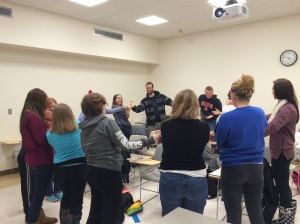 This is not a lecture I typically give in my introductory psychology course. Nor is it a metaphysical explanation for human behavior. Here, I reflect on the factors that I believe motivate us to continue our journey – especially our professional journey – despite the odds.
This is not a lecture I typically give in my introductory psychology course. Nor is it a metaphysical explanation for human behavior. Here, I reflect on the factors that I believe motivate us to continue our journey – especially our professional journey – despite the odds.
Most of my college friends are settled either as IT professionals or doctors, lucrative professions with comfortable lifestyles. People, of course, not my friends, often ask why I haven’t settled yet. They are thinking of my financial insecurity, my temporary status as a Visiting Assistant Professor, and my hectic work schedule, not to mention the little time I have to spend with family and friends. My answer is simple: I love teaching, and I am passionate about research. So far, so good.
What is not convincing – even to me – is my answer to the follow-up question: why do I like it? My typical response is about the importance of disseminating knowledge to the next generation and the role teachers play in shaping our society. Although I believe teaching and research are noble endeavors, I do not accept that people persevere, against all odds, only to help others. Not even me.
In a field that, at least in the beginning, does not give much in terms of financial or professional rewards, I am not satisfied that pure altruism is sufficient motivation. Perhaps I am a self-absorbed megalomaniac, who reinforces his opinions through teaching. Or maybe I like the power I have over my students. Maybe I can’t survive outside of academia or am too lazy to work in a nine-to-five job. Such thoughts engulfed my mind and gave me restless nights until I experienced an ‘Aha!’ moment. My revelation happened on a Saturday afternoon while playing with my daughter, Nirvana, who turned two a few weeks ago.
I love spending time with Nirvana. She amazes me every day, and every moment is filled with joy. That Saturday, I asked myself, “Why do I love to spend time with my daughter?” My first thought was that I simply love her unconditionally. She is not apart from me; she is an extension of me. My rationale was that the drive to love and be with our offspring is innate, fundamental. While it is true that I love Nirvana unconditionally, it still begs the question, how is it that I can truly enjoy every moment of our interactions? I knew there must be something that keeps me going. A careful evaluation of our interactions and a deeper look at the activities Nirvana and I enjoy gave me some clarity.
What motivates me is the pleasure of watching her grow and the opportunities she gives me to discover new ways to teach her. As an example, initially she would only explore the pictures in our reading sessions. My every attempt to draw her attention to the words was fruitless. Eventually, I learned to acknowledge what it was about our reading sessions that she appreciated. In a way, she taught me to learn with her. In doing so, I enjoyed exploring the world with her, in novel and interesting ways.
An obvious fact emerged. We can’t teach our kids, or anyone, for that matter. We can only give them opportunities to explore their own unique learning methods, so they can discover the mysteries of the world on their own. It did not take me long to realize that teaching is not so different from parenting, after all.
It is now my belief that teaching, like parenting, is a dynamic process of exploring, testing and learning novel ways to share and gain knowledge. A more important point is that it is not only the student who learns; it is also the teacher who becomes more proficient at providing better learning opportunities and appropriately challenging the students, so they can unlock their unique potential.
So, my revelation is that the “why” I do what I do is similar to why I love spending time with my daughter. It is the pleasure of watching them grow and the adventure of growing with them. It is the fulfillment I feel when I see how my students, and my daughter, use the knowledge I share in ways that I could have never imagined. It is my conviction that a committed teacher is like a caring parent, who learns to let the child learn. This is why I do what I do.
“Why” do YOU do what you do?